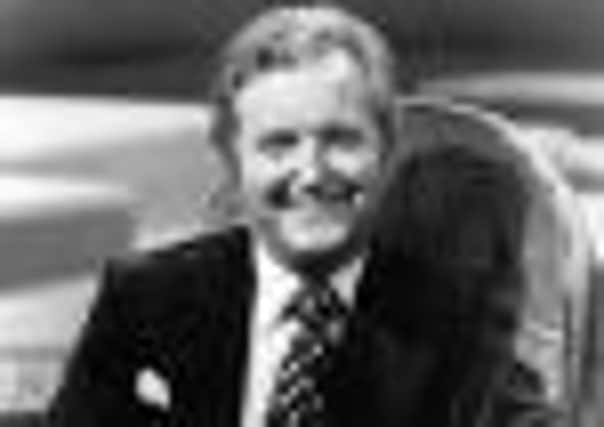Obituary: Derek Batey, genial presenter of Border Television’s Mr and Mrs and northern host of Come Dancing


Derek Batey was one of the principal forces in Border Television – both in front of the camera and in the boardroom. He gave the regional company its first nationally networked show – Mr and Mrs – and appeared on the station’s inaugural evening on 3 September, 1961. Originally he was a presenter/interviewer but such was his grasp of the business, his relaxed manner in front of the camera and his ability to identify with his audience that he was promoted to production manager.
It will, however, be Mr and Mrs with which he is most closely associated by the public. He produced and presented the show from the outset in 1967; with his genial smile, kipper tie and smart beige suit Batey gave a warm and friendly image on the screen. He was a charming host who never tried to outshine his contestants and ensured, however nervous they were, that they were stars of the show.
Advertisement
Hide AdAdvertisement
Hide AdBatey often witnessed some unscripted incidents. He once recalled: “During a recording a wig came shooting off a contestant’s head. This woman placed the headphones over her thick dark hair. She sat down with hair like Ken Dodd and stood up looking like Kojak. It was an awkward moment.”
Derek Batey was educated at the local grammar school in Brampton, Cumbria. He used to attend the Variety Theatre in Carlisle and his interest in performing was stimulated by the likes of Sir Harry Lauder and Will Fyffe. In fact, Batey was keen to become a ventriloquist but on leaving school in 1944 he was articled to a firm of accountants in Carlisle. After national service in the RAF he continued working as an accountant but was asked to audition for the BBC firstly as a ventriloquist then as a presenter. Batey made his first appearance on television in 1957 and soon became the northern presenter of Come Dancing. While Peter West fronted the show in London, Batey interviewed the ladies about the yards of tulle in their dresses and the thousands of sequins they had sewn on by hand.
In 1960 he was approached by Border TV to join the new station and not only left Come Dancing but gave up accountancy.
Batey was to work on many magazine programmes for Border TV but his big break came in 1967 when he saw a promo tape of Mr and Mrs and booked a 13-week run for Border. It was a shrewd move and proved a huge success, giving the station a national profile and making Batey a wealthy man.
The format was simple. It was a quiz game with Batey posing all the questions and being the genial and always jolly host.
One half of the couple went into a booth with headphones on so he/she could not hear the questions or answers while the other fielded questions about their domestic life. The questions were never too arduous: “What is your husband’s favourite root vegetable?” or “Would you ask your husband’s advice about the new curtains in the lounge?”
When they got the answers right Batey threw his arms around the contestants in glee. He then often made a donation to a charity of their choice, and tantalisingly fanned out the prize money.
Many criticised the show for its bland predictability. But it gave much pleasure to many and became an easy and enjoyable programme to watch in the early evening.
Advertisement
Hide AdAdvertisement
Hide AdIn that same year Batey devised a talk show called Look Who’s Talking. His first guest was Ken Dodd. Again, it proved a success and was picked up by the other ITV stations. His cosy, friendly style was further recognised when he was asked to host the Sunday night early evening programme, Your Hundred Best Hymns.
But Batey proved a canny operator and in 1975 produced Mr and Mrs on stage and for 12 years did occasional shows at the Central Pier in Blackpool. In fact, he presented Mr and Mrs more than 500 times on television and in excess of 5,000 times on stage. Many of the stage shows were in aid of the Trinity Hospice in the Fylde Day Centre near Blackpool.
Border appointed him firstly assistant controller of programmes and then gave him a seat on the board. The income his programmes generated for the company was considerable and what he achieved for the network on limited resources should not be underestimated.
Batey lived with his wife and daughter in St Annes-on-Sea and in their holiday home in Florida. He had met his wife Edith while in the RAF. They married in 1950 and she and their daughter survive him.
Alasdair Steven